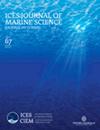Trophic flows to mesozooplankton support the conventional paradigm of pelagic food web structure in ocean ecosystems
IF 3.4
2区 农林科学
Q1 FISHERIES
引用次数: 0
Abstract
The current conventional paradigm of ocean food web structure inserts one full level or more of microzooplankton heterotrophic consumption, a substantial energy drop, between phytoplankton and mesozooplankton. Using a dataset with contemporaneous measurements of primary production (PP), size-fractioned mesozooplankton biomass, and micro- and mesozooplankton grazing rates from 10 tropical to temperate ocean ecosystems, we examined whether the structural inefficiencies in this paradigm allow sufficient energy transfer to support active metabolism and growth of observed zooplankton standing stocks. Zooplankton carbon requirements (ZCR) were determined from allometric equations that account for ecosystem differences in temperature and size structure. ZCRs were relatively low (∼30% of PP or less) for both oligotrophic systems and bloom biomass accumulation in eutrophic coastal waters. Higher relative ZCRs (>30% PP) were associated with elevated mesozooplankton grazing scenarios (bloom declines, abundant salps), advective subsidies, and open-ocean upwelling systems. Microzooplankton generally dominated as grazers of PP but were equal or secondary to direct herbivory as nutritional support for mesozooplankton in five of eight regional studies. All systems were able to satisfy ZCR within the conventional food-web interpretation, but balanced open-ocean upwelling systems required the most efficient alignments of contributions from microzooplankton grazing, direct herbivory, and carnivory to do so.中层浮游生物的营养流支持海洋生态系统中上层食物网结构的传统范式
目前传统的海洋食物网结构模式在浮游植物和中浮游生物之间插入了一个完整的或更多层次的微浮游生物异养消耗,即大量的能量下降。利用对 10 个热带到温带海洋生态系统的初级生产量(PP)、大小分化的中浮游生物生物量以及微浮游动物和中浮游动物捕食率的同期测量数据集,我们考察了这一范式中的结构低效是否允许足够的能量转移来支持所观察到的浮游动物常量的活性代谢和生长。浮游动物碳需求量(ZCR)是根据异速方程确定的,该方程考虑了生态系统在温度和大小结构上的差异。对低营养系统和富营养化沿岸水域的水华生物量积累而言,ZCR 都相对较低(PP 的 30%或更低)。在低营养系统和富营养化沿岸水域,藻华生物量的积累相对较低(PP 的 30%或更低)。较高的相对 ZCRs(PP 的 30%)与中浮游动物掠食(藻华减少、盐类丰富)、平流补给和公海上升流系统有关。在 8 项区域研究中,有 5 项研究发现,微浮游动物通常是 PP 的主要食草动物,但在中层浮游动物的营养支持方面,微浮游动物与直接食草动物相等或次于直接食草动物。在传统的食物网解释中,所有系统都能满足ZCR的要求,但平衡的开阔洋上升流系统需要微浮游动物食草、直接食草和食肉的最有效组合才能满足ZCR的要求。
本文章由计算机程序翻译,如有差异,请以英文原文为准。
求助全文
约1分钟内获得全文
求助全文
来源期刊

ICES Journal of Marine Science
农林科学-海洋学
CiteScore
6.60
自引率
12.10%
发文量
207
审稿时长
6-16 weeks
期刊介绍:
The ICES Journal of Marine Science publishes original articles, opinion essays (“Food for Thought”), visions for the future (“Quo Vadimus”), and critical reviews that contribute to our scientific understanding of marine systems and the impact of human activities on them. The Journal also serves as a foundation for scientific advice across the broad spectrum of management and conservation issues related to the marine environment. Oceanography (e.g. productivity-determining processes), marine habitats, living resources, and related topics constitute the key elements of papers considered for publication. This includes economic, social, and public administration studies to the extent that they are directly related to management of the seas and are of general interest to marine scientists. Integrated studies that bridge gaps between traditional disciplines are particularly welcome.
 求助内容:
求助内容: 应助结果提醒方式:
应助结果提醒方式:


